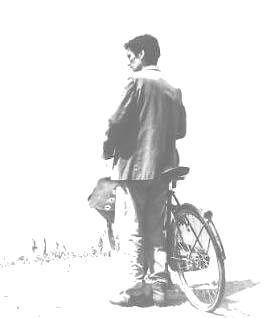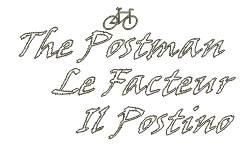|
|
Le poète et les pouvoirs de la métaphore
1995 Academy Award Winner:
· Best Original Score: Luis Bacalov
Dans le film de Michael Radford, le Facteur, le poète Pablo Neruda enseigne les mots
qui ne meurent pas.
Un village perdu de pêcheurs, à Salina, l'une des îles Lipari, des façades aux couleurs
délavées sous un soleil aveuglant, et puis des intérieurs obscurs et pauvres.
Il ne s'agit pas d'un vieux film néo-réaliste, mais d'une fable en images,
tirée du beau récit,"le Facteur", de Michael Radford. Une ardente patience,
de l'écrivain chilien, Antonio Skarmeta. A table, un vieil homme, cuillerée
après cuillerée, est tout concentré sur son assiette de soupe. En face de lui,
Mario, son fils, s'éternise dans un discours cahotant, où les mots butent,
se heurtent, coulent fluides un instant, puis se tarissent, se perdent en un
marmonnement relayé par une main qui se frotte le nez, une bouche qui se triture
la lèvre inférieure. Son visage aux joues creuses, mangé par un regard noir où
vacillent des lueurs d'attente et d'appréhension, s'impose à l'écran et, en fait,
l'occupera jusqu'à la fin, même absent.
Dans cette scène, et dans bien d'autres,
les gestes gauches, la voix nouée ou traînante, les mimiques d'incertitude de
Mario, curieux mélange de traits pasoliniens et d'expressions à la Chaplin,
confèrent un caractère tellement sacré à la moindre parole, que bonjour ou au revoir
deviennent dans sa bouche des messages essentiels et profonds. C'est en fait le pouvoir
des mots, au coeur de cette histoire, qui va faire naître une amitié entre Mario -
Massimo Troisi - et le célèbre Pablo Neruda - Philippe Noiret.
Mario est un jeune
pêcheur, reconverti en facteur, qui, chaque jour, après un parcours éreintant à
bicyclette, à travers falaises et montagnes, remet son courrier au poète chilien,
exilé, dans une demeure isolée. La sacralité qu'il confère aux mots les plus simples
est déjà un élément favorable à une rencontre entre eux deux. Les effets concrets de
la poésie - des tonnes de lettres, essentiellement féminines, acheminées vers le poète -
font le reste du travail, éblouissant le facteur, et lui donnant le courage d'aborder
l'étranger. Une sorte de communauté d'intérêt s'instaure donc naturellement entre les
deux hommes qui, somme toute, font un travail assez proche consistant à déplacer des
messages: le facteur physiquement, de la poste à la demeure de Neruda et le poète
sémantiquement, d'un sens à un autre.
Non par hasard, le terme métaphore scelle une amitié entre eux. Il est énoncé un
beau jour par le poète: les yeux du facteur s'écarquillent de stupéfaction devant
ce vocable exotique destiné à évoquer une réalité familière. Alors Neruda explique
et illustre. Mario réplique: "En vous écoutant, je me sentais comme une barque
ballottée par toutes ces paroles." Cette image conçue involontairement est
le premier pas de notre apprenti-poète.
Toutefois, si les pouvoirs de la métaphore
sont infinis, cet art magique ne s'apprend pas en un jour et Mario, pris par
l'urgence de séduire une jolie serveuse de gargote, est contraint d'emprunter
les images de Neruda pour éblouir sa Béatrice aux yeux de braise. Et à son auteur,
un peu froissé de ce plagiat, Mario, qui décidément assimile tout de son maître -
même son idéal politique - réplique imperturbable que la poésie appartient à celui
qui s'en sert et non à celui qui l'écrit.
Les vers en question déclenchent un ouragan sur le village endormi, ils font d'une
d'une Béatrice tigresse une proie consentante, ils font que "son sourire s'étire
comme un papillon ", ils dénudent son corps jamais vu, même aux yeux effarés
du curé, déclenchent une croisade familiale pour sauver son honneur menacé,
et finalement apportent à Mario le mariage espéré.
Mais le film ne finit pas là.
Un jour, Mario avait demandé: "Come si diventa poeta?" Et Neruda avait répliqué:
"Tu descends au bord de la mer et le long du chemin tu observes attentivement
tout ce qu'il y a autour de toi." Mario a appliqué scrupuleusement ce conseil
et en a fait une règle de vie, en particulier après le départ de l'écrivain,
retourné dans son pays. Il a observé et enregistré pour Neruda et ses amis de
la Pampa: la vaguelette sur la plage de son île, la grosse vague sur les rochers,
le vent dans les buissons, la tempête dans la colline, etc.jusqu'aux battements
du coeur de son fils dans le ventre de Béatrice...et puis aussi une grande
manifestation communiste à Naples, où il devait lire ses poésies,
et puis la charge des CRS et puis plus rien du tout: il fut piétiné et tué. Au-delà
du film, il transmet un message qui pourrait être: les mots neufs, eux, même piétinés,
ne meurent pas. Alors, regardez autrement, pour voir autre chose: déplacez ce que vous
pouvez et comme vous pouvez, l'art de la métaphore est une nécessité vitale.
The Postman
1995 Academy Award Winner:
Best Original Score: Luis Bacalov
On a small island in the Mediterranean Sea
there is a world-famous poet,
Pablo Neruda,
in exile, and the year is 1952....
Pablo Neruda has been exiled from his homeland of Chilé, forced to live
on a primitive island in the Mediterranean Sea. While he lives comfortably,
he and his wife, Matilde, long to return home.
Plagued by natural and social poverty, the island is simple and comprised mainly of simple
people who live for their every-day tasks. It is an island of fishermen. Its shores
become a backdrop for which Neruda paints his masterpieces of words.
Mario Ruoppolo is a simple man who lives with his nonverbal father. He has dreams
of America in his head but dismisses them as merely dreams and nothing more when
it is registered in his mind that reaching American soil one day proves
impossible. He is in need of work but doesn't want to follow in his father's
footsteps of being a fisherman.
Wandering one day Mario happens upon the local post office, where he reads a sign on
the door that indicates that help is needed from someone who is literate
and has a bicycle.
He immediately walks in to apply for the job and is interviewed. Once it is
proven that he can read and that he owns a bicycle he is hired. His assignment
is to bring Neruda's mail to him every morning. He has strict instructions from
the owner of the post office not to bother Mr. Neruda because he is a very busy
man hard at work writing poetry for "the people."
With little knowledge of Neruda Mario rides to the mountaintop to deliver the
large sum of mail for the poet. At first, when Ruoppolo tries to strike up
conversation with Neruda, the poet's reaction is nearly nonexistent. But, over time,
he begins to speak to the young man and counteracts with simple interaction.
Simple interaction grows into a more intimate friendship
in which discussion often leads to the meaning of metaphors and poetry.
Neruda teaches Ruoppolo how to feel life, and how to sit by the sea and devour the
natural beauty of "small flowers."
As the friendship intensifies, Ruoppolo finds himself quickly in
love with a local girl named Beatrice Russo. Dumbfounded and
childishly temperamental, he turns to his poet friend for the
answers to his questions and how to win Beatrice's heart. He proposes
that Neruda write a poem for Beatrice so that she may think that Mario wrote it.
While Neruda refuses to write a poem for Beatrice, he does give Ruoppolo advice,
and encourages him to write poetry and create metaphors. So, taking his friend
for an example, Mario begins to write his own poetry, comparing Beatrice
to a butterfly.
Ruoppolo and Beatrice soon wed. At their reception, Neruda announces that he has
been granted permission to return to his homeland. It is a lamented yet joyous
moment of the film in which everything that has existed prior finally succeeds
into its original purpose. Neruda can return home and Mario marries the love
of his life.
Ruoppolo humbly bids Neruda a farewell.
Mario and Beatrice soon decide that the name of their first child will be
Pablito.
Months pass without word from Neruda, and the small island community begins
to question if he was ever a friend at all. But all feelings of contempt for
the poet are dismissed when a letter is received. Mario opens it only to
find that it is a formal letter from Neruda's secretary requesting that
all of the Neruda's belongings be shipped home to Chilé.
Mario considers himself a failure, and begins to question if he ever was
friends with the world-famous Pablo Neruda.
When he goes back to Neruda's old house to collect belongings, he discovers a
device he had forgotten about in which you can record your own voice and play
it back. So Mario, confident that Neruda still remembers him, records all the sounds
of the island: the wind, the sea, the sound of his unborn child moving in its
mother's womb. Modestly and bravely Mario plunges himself into the commitment
of recording all of Neruda's favorite sounds: the simple complexities that make
up life, and the unbounded praise that sets a literary phenomenon.
While recording sounds on the island, Mario discovers a newfound love for his
homeland, and divides his inability to see the beauty of it from his soul.
He writes a poem called Canto a Pablo Neruda (Song for Pablo Neruda) and is
invited to read it in front of a crowd at Naples.
In Naples, the crowd is large and full of those with eager ears. As he awaits
his turn at the podium to read, he finally discovers self-worth and self-importance.
When his name is called, he gladly and proudly begins to move through the crowd
toward the stage. But elsewhere there is trouble, and in frantic confusion the
crowd begins to riot, and gunshot blasts are heard. Mario Ruoppolo is no more.
Years later, as Pablito grows to be a toddler, Neruda finally returns to
the small island. He finds that his friend is dead. Beatrice explains the recordings
Mario made before his death and tells Neruda that she kept them because
they were a remembrance of her late husband.
After news of Mario's death, a teary-eyed Neruda goes once more to the shores
of the island and is swept away not only by nature, but by the memory of his
long-lost friend.
|
|---|



